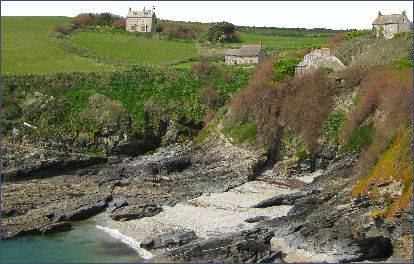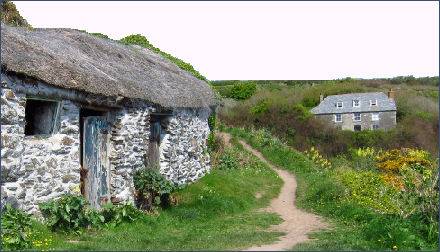Prussia Cove
OS grid ref:- SW556299
 Secluded Prussia Cove or Porth-en-Alls as it is known in Cornish, lies to the east of Cudden Point on the coast of Mount's Bay.
Secluded Prussia Cove or Porth-en-Alls as it is known in Cornish, lies to the east of Cudden Point on the coast of Mount's Bay.
The cove has a famous history of smuggling and was one of the foremost locations for landing and storing contraband. This is mainly due to the actions of the notorious John Carter, an eighteenth century smuggler who operated from the cove and was known as the King of Prussia.
The terrace of seven listed cottages overlooking Coule's Cove and Mount's Bay were built in 1826 by the Coastguard to counteract the smugglers and are known as Coastguard Cottages. Standing above the cottages is a Victorian house built in 1885 for du Boulay, former Archdeacon of Cornwall in his retirement.
Small scale fishing is carried out from the cove, the picturesque granite fishing huts dot the shoreline above the slipway at Bessy's Cove.
Prussia Cove, known in Cornish as Porth Legh can only be reached on foot, the nearest parking being approximately half a mile away. Small scale fishing is carried out from the cove.
Just around the corner from Prussia Cove lies sandy Keneggy Beach, which can only be reached by rope ladders attached to the cliffs.
John Carter, King of Prussia
John Carter was born in 1738. His nickname derives from a childood game of soldiers he often played with his brothers Francis, Harry and Charles, John would take the role of the contemporary King of Prussia, Frederick the Great. The nickname stuck.
 It appears Carter was equally as charismatic as his hero and his nickname rechristened the cove. Carters' exploits include firing cannon at Revenue shipping, breaking in to Revenue premises but taking only his goods which had earlier been expropriated. The Carter's operated from three small inlets, Pisky's Cove on the west side, Bessie's Cove and King's Cove.
It appears Carter was equally as charismatic as his hero and his nickname rechristened the cove. Carters' exploits include firing cannon at Revenue shipping, breaking in to Revenue premises but taking only his goods which had earlier been expropriated. The Carter's operated from three small inlets, Pisky's Cove on the west side, Bessie's Cove and King's Cove.
Numerous clashes took place between John Carter and his brothers and the Customs men, the Carter brothers stationed a battery of guns on the cliffs above the cove. Many of which are documented in a colourful autobiography written by these exploits have been recorded by Harry Carter, who later reformed and became a preacher.
John Carter acquired a reputation for honest dealing among the smuggling fraternity. One tale relates how he broke into the custom house at Penzance to regain some confiscated tea which was stored there. His companions were reluctant to aid such a risky venture, but John explained that he really had no other option as he had promised to deliver the tea by a certain date. The excisemen, returning next morning to find the custom house ransacked commented 'John Carter has been here, and we know it because he is an upright man, and has taken away nothing which was not his own.'
Harry describes many of the Carter's exploits in his book. An ill-fated smuggling trip almost resulted in his death. As he guided his vessel into the harbour at Cawsand, Harry assumed that the two small craft which drew alongside his were preparing to unload his cargo of contraband. Too late it dawned on him that they were actually from a man-of-war, and a fierce battle with the authorities ensued.
Harry was struck to the ground in the melee and left for dead, but after several hours had passed, his body remained warm although 'his head is all to atoms' as one of the guards observed. He managed to crawl across the deck and drop into the water, he was picked up, severely injured, by local men. He relates in the book 'My strength was allmoste exhausted; my breath, nay, my life, was allmoste gone....The bone of my nose cut right in two, and two very large cuts in my head, that two or three pieces of my skull worked out afterwards'.
John Carter mysteriously disappeared, presumed dead in 1807.
Pirates, Smugglers and Wreckers of Cornwall